Benefits of Family Strengths Assessment in Clinical Practice
VerifiedAdded on 2020/12/24
|6
|1189
|197
Report
AI Summary
This report delves into the advantages of incorporating family strengths assessments into clinical practice, emphasizing the family-centered approach's effectiveness in achieving nursing goals. It highlights how assessing family strengths enables healthcare providers to understand patient needs better and strengthen family functioning, thereby minimizing psychological stress and enhancing patient recovery. The report discusses the integration of strength-based nursing care (SBNC) principles, such as personal and family-centered care and holistic care, to empower families and improve patient outcomes. It also examines various family strength assessment tools, including the Australian Family Strengths Nursing Assessment (AFSNA), Eco-map tool, Head Start's scaled tool, and the Calgary family assessment model, illustrating their roles in analyzing family resources, monitoring progress, and identifying family structures and functions. Furthermore, the report underscores the bidirectional interaction between nursing practices and strength-based well-being, emphasizing how family support significantly impacts patient outcomes, particularly in managing conditions like dementia and anxiety, by addressing the root causes of problems and providing tailored care services.
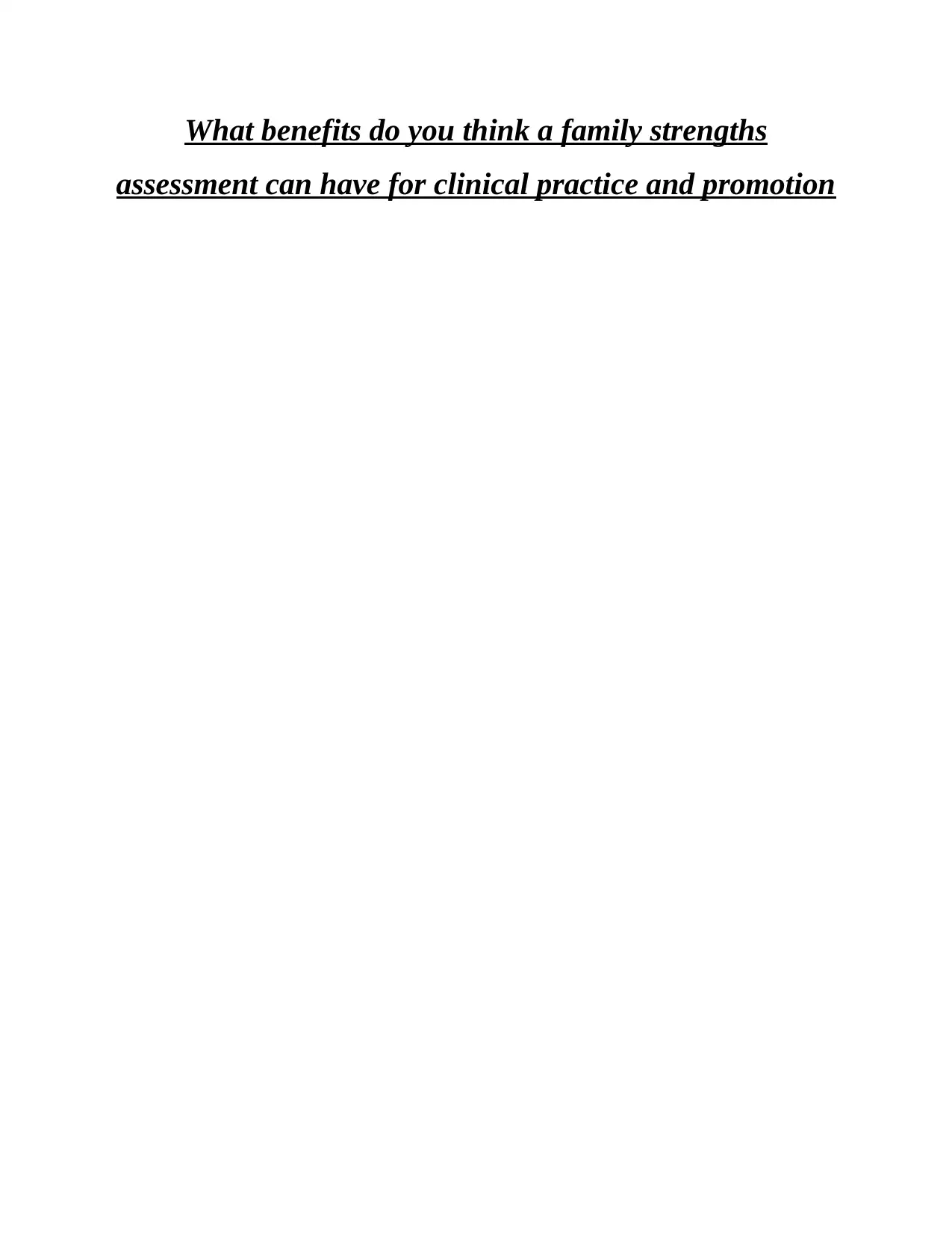
What benefits do you think a family strengths
assessment can have for clinical practice and promotion
assessment can have for clinical practice and promotion
Paraphrase This Document
Need a fresh take? Get an instant paraphrase of this document with our AI Paraphraser
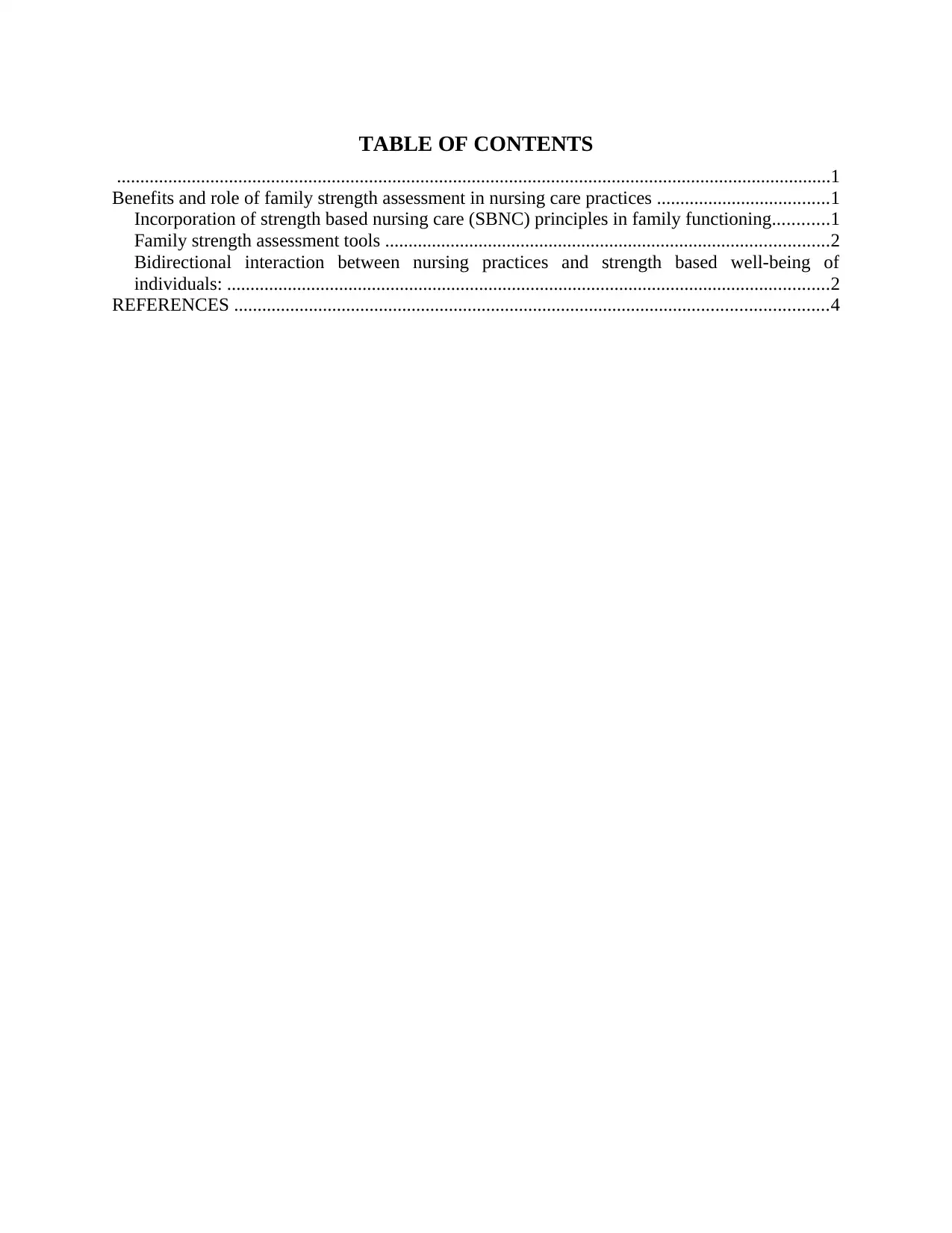
TABLE OF CONTENTS
.........................................................................................................................................................1
Benefits and role of family strength assessment in nursing care practices .....................................1
Incorporation of strength based nursing care (SBNC) principles in family functioning............1
Family strength assessment tools ...............................................................................................2
Bidirectional interaction between nursing practices and strength based well-being of
individuals: .................................................................................................................................2
REFERENCES ...............................................................................................................................4
.........................................................................................................................................................1
Benefits and role of family strength assessment in nursing care practices .....................................1
Incorporation of strength based nursing care (SBNC) principles in family functioning............1
Family strength assessment tools ...............................................................................................2
Bidirectional interaction between nursing practices and strength based well-being of
individuals: .................................................................................................................................2
REFERENCES ...............................................................................................................................4
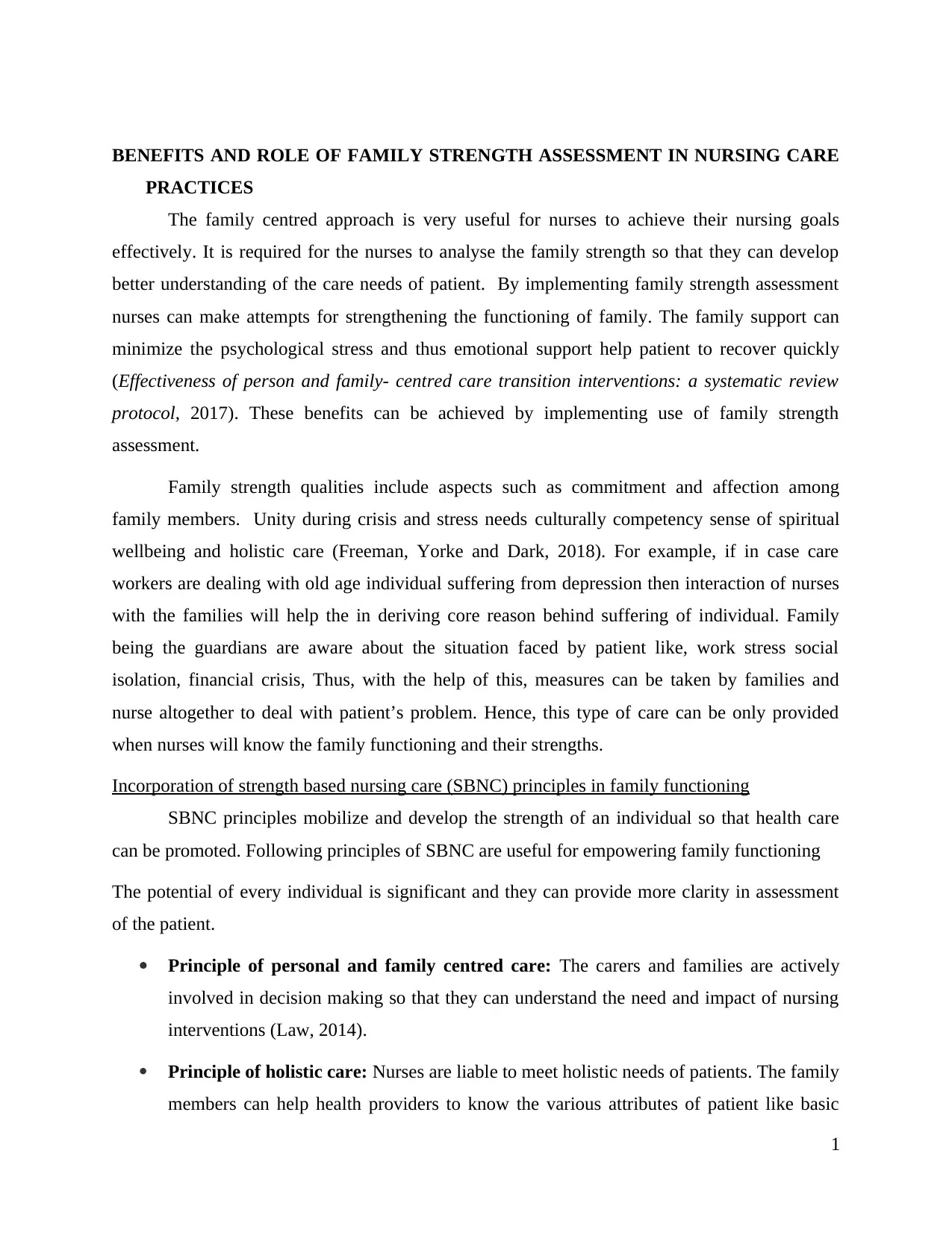
BENEFITS AND ROLE OF FAMILY STRENGTH ASSESSMENT IN NURSING CARE
PRACTICES
The family centred approach is very useful for nurses to achieve their nursing goals
effectively. It is required for the nurses to analyse the family strength so that they can develop
better understanding of the care needs of patient. By implementing family strength assessment
nurses can make attempts for strengthening the functioning of family. The family support can
minimize the psychological stress and thus emotional support help patient to recover quickly
(Effectiveness of person and family- centred care transition interventions: a systematic review
protocol, 2017). These benefits can be achieved by implementing use of family strength
assessment.
Family strength qualities include aspects such as commitment and affection among
family members. Unity during crisis and stress needs culturally competency sense of spiritual
wellbeing and holistic care (Freeman, Yorke and Dark, 2018). For example, if in case care
workers are dealing with old age individual suffering from depression then interaction of nurses
with the families will help the in deriving core reason behind suffering of individual. Family
being the guardians are aware about the situation faced by patient like, work stress social
isolation, financial crisis, Thus, with the help of this, measures can be taken by families and
nurse altogether to deal with patient’s problem. Hence, this type of care can be only provided
when nurses will know the family functioning and their strengths.
Incorporation of strength based nursing care (SBNC) principles in family functioning
SBNC principles mobilize and develop the strength of an individual so that health care
can be promoted. Following principles of SBNC are useful for empowering family functioning
The potential of every individual is significant and they can provide more clarity in assessment
of the patient.
Principle of personal and family centred care: The carers and families are actively
involved in decision making so that they can understand the need and impact of nursing
interventions (Law, 2014).
Principle of holistic care: Nurses are liable to meet holistic needs of patients. The family
members can help health providers to know the various attributes of patient like basic
1
PRACTICES
The family centred approach is very useful for nurses to achieve their nursing goals
effectively. It is required for the nurses to analyse the family strength so that they can develop
better understanding of the care needs of patient. By implementing family strength assessment
nurses can make attempts for strengthening the functioning of family. The family support can
minimize the psychological stress and thus emotional support help patient to recover quickly
(Effectiveness of person and family- centred care transition interventions: a systematic review
protocol, 2017). These benefits can be achieved by implementing use of family strength
assessment.
Family strength qualities include aspects such as commitment and affection among
family members. Unity during crisis and stress needs culturally competency sense of spiritual
wellbeing and holistic care (Freeman, Yorke and Dark, 2018). For example, if in case care
workers are dealing with old age individual suffering from depression then interaction of nurses
with the families will help the in deriving core reason behind suffering of individual. Family
being the guardians are aware about the situation faced by patient like, work stress social
isolation, financial crisis, Thus, with the help of this, measures can be taken by families and
nurse altogether to deal with patient’s problem. Hence, this type of care can be only provided
when nurses will know the family functioning and their strengths.
Incorporation of strength based nursing care (SBNC) principles in family functioning
SBNC principles mobilize and develop the strength of an individual so that health care
can be promoted. Following principles of SBNC are useful for empowering family functioning
The potential of every individual is significant and they can provide more clarity in assessment
of the patient.
Principle of personal and family centred care: The carers and families are actively
involved in decision making so that they can understand the need and impact of nursing
interventions (Law, 2014).
Principle of holistic care: Nurses are liable to meet holistic needs of patients. The family
members can help health providers to know the various attributes of patient like basic
1
⊘ This is a preview!⊘
Do you want full access?
Subscribe today to unlock all pages.

Trusted by 1+ million students worldwide
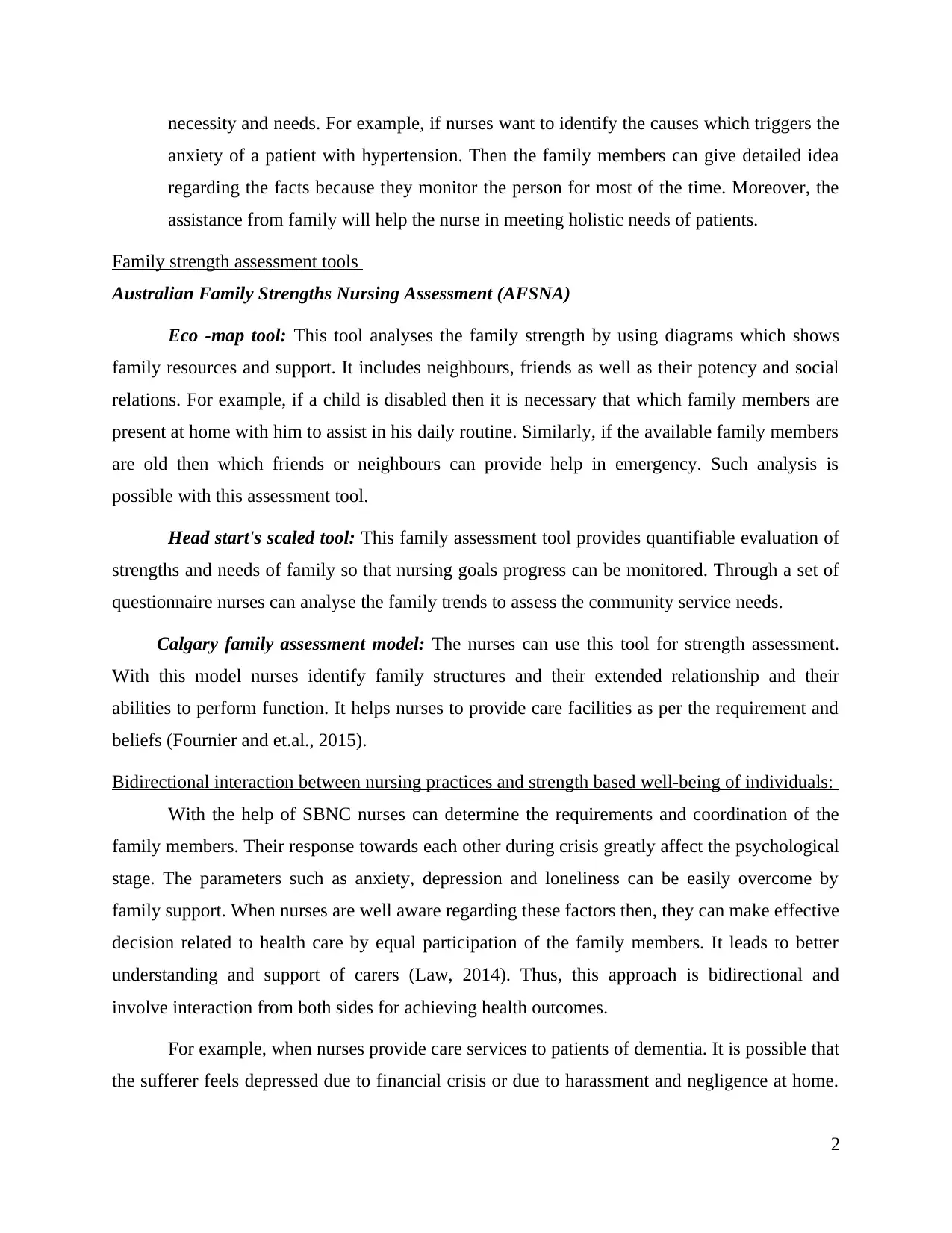
necessity and needs. For example, if nurses want to identify the causes which triggers the
anxiety of a patient with hypertension. Then the family members can give detailed idea
regarding the facts because they monitor the person for most of the time. Moreover, the
assistance from family will help the nurse in meeting holistic needs of patients.
Family strength assessment tools
Australian Family Strengths Nursing Assessment (AFSNA)
Eco -map tool: This tool analyses the family strength by using diagrams which shows
family resources and support. It includes neighbours, friends as well as their potency and social
relations. For example, if a child is disabled then it is necessary that which family members are
present at home with him to assist in his daily routine. Similarly, if the available family members
are old then which friends or neighbours can provide help in emergency. Such analysis is
possible with this assessment tool.
Head start's scaled tool: This family assessment tool provides quantifiable evaluation of
strengths and needs of family so that nursing goals progress can be monitored. Through a set of
questionnaire nurses can analyse the family trends to assess the community service needs.
Calgary family assessment model: The nurses can use this tool for strength assessment.
With this model nurses identify family structures and their extended relationship and their
abilities to perform function. It helps nurses to provide care facilities as per the requirement and
beliefs (Fournier and et.al., 2015).
Bidirectional interaction between nursing practices and strength based well-being of individuals:
With the help of SBNC nurses can determine the requirements and coordination of the
family members. Their response towards each other during crisis greatly affect the psychological
stage. The parameters such as anxiety, depression and loneliness can be easily overcome by
family support. When nurses are well aware regarding these factors then, they can make effective
decision related to health care by equal participation of the family members. It leads to better
understanding and support of carers (Law, 2014). Thus, this approach is bidirectional and
involve interaction from both sides for achieving health outcomes.
For example, when nurses provide care services to patients of dementia. It is possible that
the sufferer feels depressed due to financial crisis or due to harassment and negligence at home.
2
anxiety of a patient with hypertension. Then the family members can give detailed idea
regarding the facts because they monitor the person for most of the time. Moreover, the
assistance from family will help the nurse in meeting holistic needs of patients.
Family strength assessment tools
Australian Family Strengths Nursing Assessment (AFSNA)
Eco -map tool: This tool analyses the family strength by using diagrams which shows
family resources and support. It includes neighbours, friends as well as their potency and social
relations. For example, if a child is disabled then it is necessary that which family members are
present at home with him to assist in his daily routine. Similarly, if the available family members
are old then which friends or neighbours can provide help in emergency. Such analysis is
possible with this assessment tool.
Head start's scaled tool: This family assessment tool provides quantifiable evaluation of
strengths and needs of family so that nursing goals progress can be monitored. Through a set of
questionnaire nurses can analyse the family trends to assess the community service needs.
Calgary family assessment model: The nurses can use this tool for strength assessment.
With this model nurses identify family structures and their extended relationship and their
abilities to perform function. It helps nurses to provide care facilities as per the requirement and
beliefs (Fournier and et.al., 2015).
Bidirectional interaction between nursing practices and strength based well-being of individuals:
With the help of SBNC nurses can determine the requirements and coordination of the
family members. Their response towards each other during crisis greatly affect the psychological
stage. The parameters such as anxiety, depression and loneliness can be easily overcome by
family support. When nurses are well aware regarding these factors then, they can make effective
decision related to health care by equal participation of the family members. It leads to better
understanding and support of carers (Law, 2014). Thus, this approach is bidirectional and
involve interaction from both sides for achieving health outcomes.
For example, when nurses provide care services to patients of dementia. It is possible that
the sufferer feels depressed due to financial crisis or due to harassment and negligence at home.
2
Paraphrase This Document
Need a fresh take? Get an instant paraphrase of this document with our AI Paraphraser
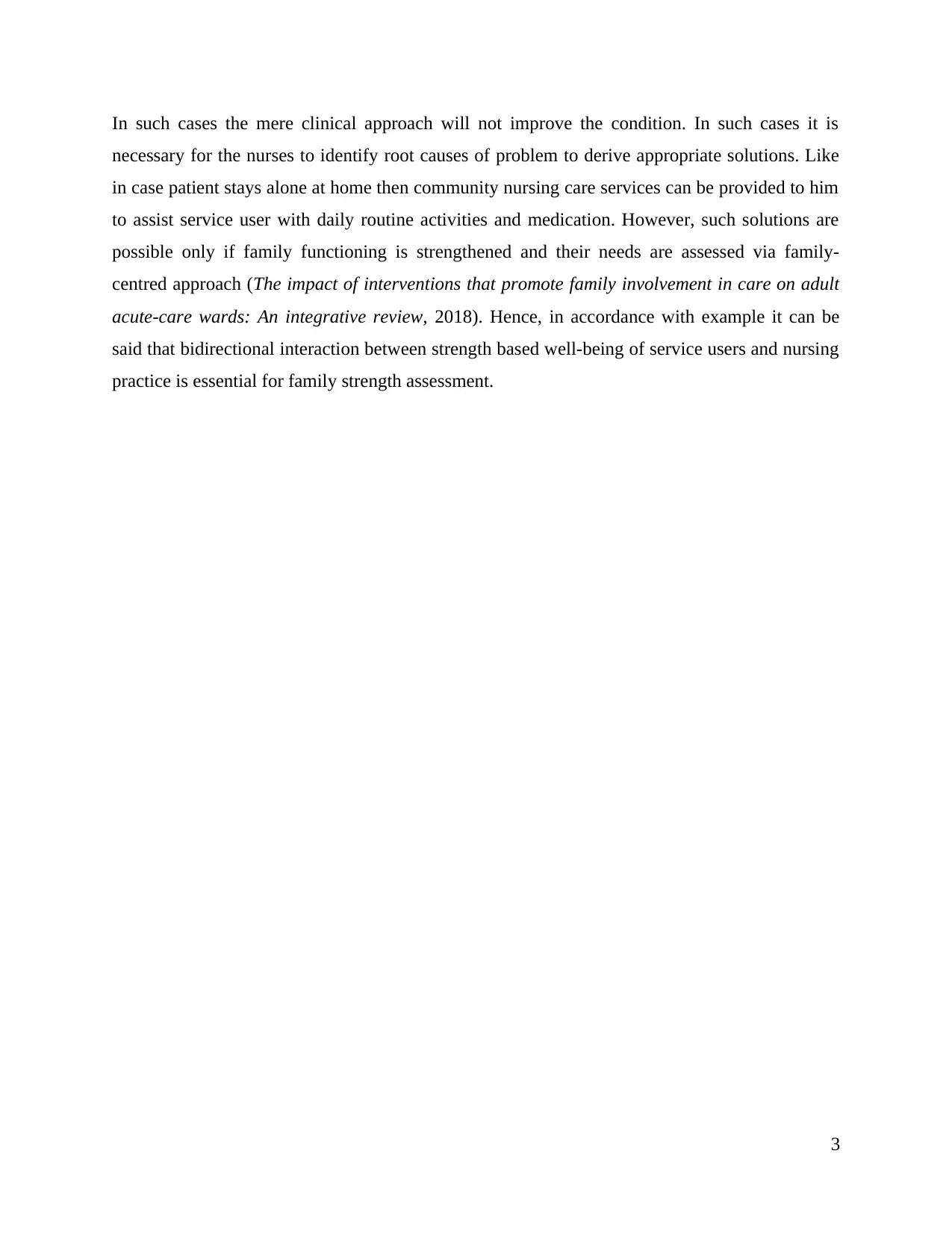
In such cases the mere clinical approach will not improve the condition. In such cases it is
necessary for the nurses to identify root causes of problem to derive appropriate solutions. Like
in case patient stays alone at home then community nursing care services can be provided to him
to assist service user with daily routine activities and medication. However, such solutions are
possible only if family functioning is strengthened and their needs are assessed via family-
centred approach (The impact of interventions that promote family involvement in care on adult
acute-care wards: An integrative review, 2018). Hence, in accordance with example it can be
said that bidirectional interaction between strength based well-being of service users and nursing
practice is essential for family strength assessment.
3
necessary for the nurses to identify root causes of problem to derive appropriate solutions. Like
in case patient stays alone at home then community nursing care services can be provided to him
to assist service user with daily routine activities and medication. However, such solutions are
possible only if family functioning is strengthened and their needs are assessed via family-
centred approach (The impact of interventions that promote family involvement in care on adult
acute-care wards: An integrative review, 2018). Hence, in accordance with example it can be
said that bidirectional interaction between strength based well-being of service users and nursing
practice is essential for family strength assessment.
3
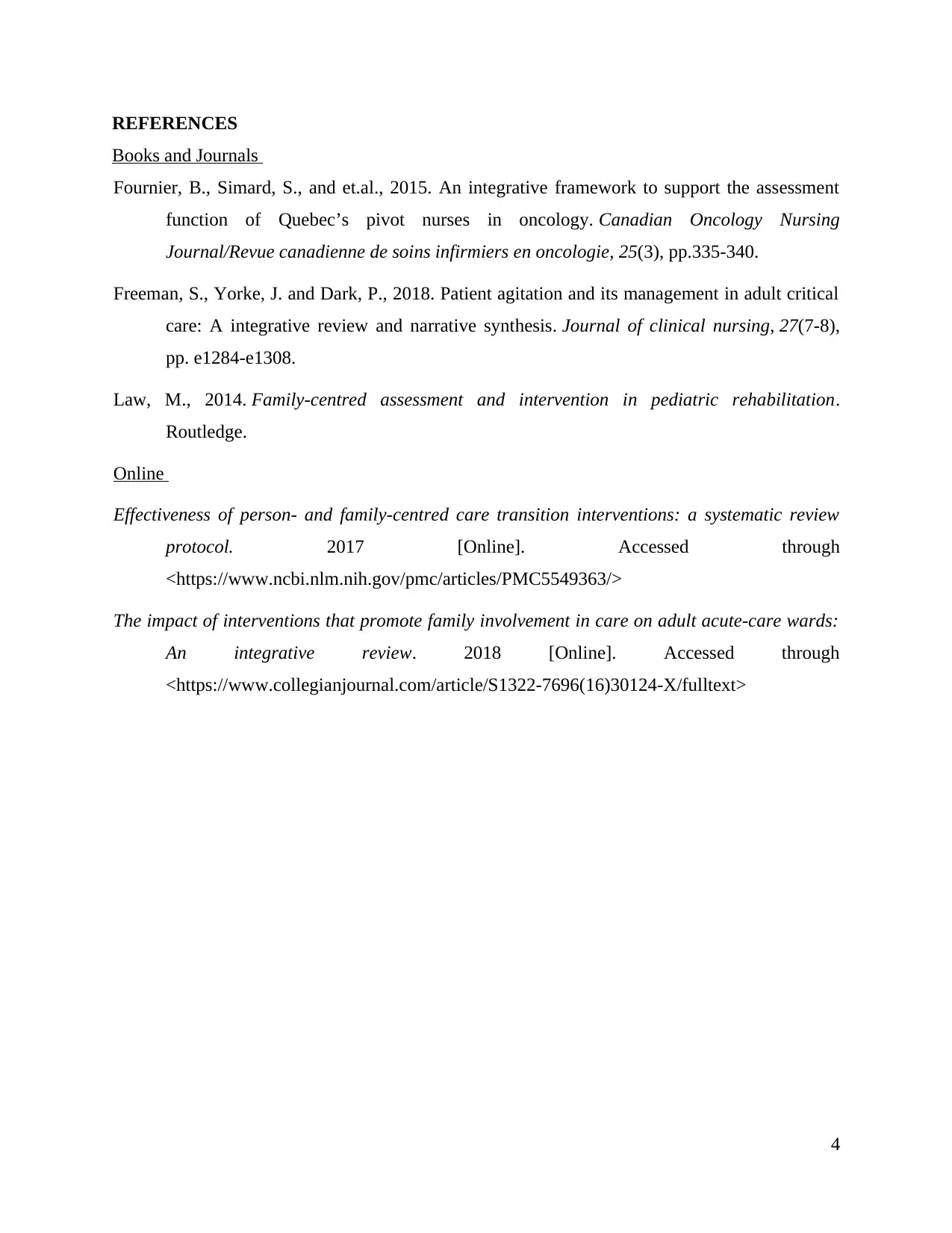
REFERENCES
Books and Journals
Fournier, B., Simard, S., and et.al., 2015. An integrative framework to support the assessment
function of Quebec’s pivot nurses in oncology. Canadian Oncology Nursing
Journal/Revue canadienne de soins infirmiers en oncologie, 25(3), pp.335-340.
Freeman, S., Yorke, J. and Dark, P., 2018. Patient agitation and its management in adult critical
care: A integrative review and narrative synthesis. Journal of clinical nursing, 27(7-8),
pp. e1284-e1308.
Law, M., 2014. Family-centred assessment and intervention in pediatric rehabilitation.
Routledge.
Online
Effectiveness of person- and family-centred care transition interventions: a systematic review
protocol. 2017 [Online]. Accessed through
<https://www.ncbi.nlm.nih.gov/pmc/articles/PMC5549363/>
The impact of interventions that promote family involvement in care on adult acute-care wards:
An integrative review. 2018 [Online]. Accessed through
<https://www.collegianjournal.com/article/S1322-7696(16)30124-X/fulltext>
4
Books and Journals
Fournier, B., Simard, S., and et.al., 2015. An integrative framework to support the assessment
function of Quebec’s pivot nurses in oncology. Canadian Oncology Nursing
Journal/Revue canadienne de soins infirmiers en oncologie, 25(3), pp.335-340.
Freeman, S., Yorke, J. and Dark, P., 2018. Patient agitation and its management in adult critical
care: A integrative review and narrative synthesis. Journal of clinical nursing, 27(7-8),
pp. e1284-e1308.
Law, M., 2014. Family-centred assessment and intervention in pediatric rehabilitation.
Routledge.
Online
Effectiveness of person- and family-centred care transition interventions: a systematic review
protocol. 2017 [Online]. Accessed through
<https://www.ncbi.nlm.nih.gov/pmc/articles/PMC5549363/>
The impact of interventions that promote family involvement in care on adult acute-care wards:
An integrative review. 2018 [Online]. Accessed through
<https://www.collegianjournal.com/article/S1322-7696(16)30124-X/fulltext>
4
⊘ This is a preview!⊘
Do you want full access?
Subscribe today to unlock all pages.

Trusted by 1+ million students worldwide
1 out of 6
Related Documents
Your All-in-One AI-Powered Toolkit for Academic Success.
+13062052269
info@desklib.com
Available 24*7 on WhatsApp / Email
![[object Object]](/_next/static/media/star-bottom.7253800d.svg)
Unlock your academic potential
Copyright © 2020–2025 A2Z Services. All Rights Reserved. Developed and managed by ZUCOL.





